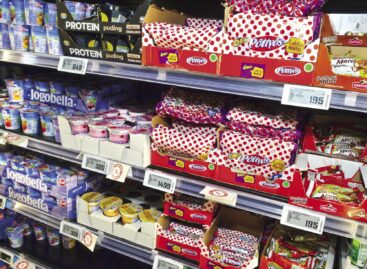With innovations in flavour and packaging size against private labels on the cereal market
With a two-digit decline in turnover, the cereal category was one of the losers in retail’s recession. Cereals are not considered base products, they are viewed as convenience products which can easily be substituted with cheaper products. Gábor Sipos, country business manager with Nestlé Hungária told us that cheaper, less processed muesli gained ground, the importance of larger packaging units increased and private labels continued their conquest. Ferenc Sárik, Cerbona Zrt.’s brand manager informed us that in the cereal category children’s products dominate – chocolate flavoured products constitute half of the market. Private labels had a significant share but not as big as among mueslis. Tamás Szilágyi, co-owner of Szimita-Trade Kft. with Edit Bárányné Szilágyi is of the opinion that there is an oversupply of cereal bars on the market. At about the same price biscuits with high cereal content can also be bought. Rita Habuda-Salyámosy, of Kellogg’s distributor Maresi Foodbroker Kft. spoke about the importance of promotions: 2+1 and 50% free campaigns have become frequent. Manufacturer brands’ position is the worst among mueslis; sales did not fall sharply in this category, but according to Dénes Kiss, Dr. Oetker Magyarország Kft.’s marketing manager there was a shift from branded products towards cheaper, private label mueslis. Private labels realised more than half of all muesli sales. Nestlé fights the trend with 45-g Nestlé Fitness products because the company thinks that office consumption might play in important role in the category in the long run. Nesquik came out in a 100-g version, targeting consumers who are unwilling to make compromises in quality. Nesquik Duo – cocoa and vanilla cereal balls – was the company’s biggest novelty this year. They also came out with Cappuccino flavoured muesli. Cerbona focuses on muesli bars and cereals this year: they renewed their children’s cereal portfolio and now 5 products are sold under the Cerbona-Disney brand name. These products have a lower sugar content and added calcium. In the muesli bar category they also came out with two new products which have no added sugar. Dr. Oetker added new flavours to its Vitalis muesli range in the last few years. Their view is that there is a group of consumers who are willing to pay a bit more for the most delicious flavours – Dr. Oetker tries to reach them with their communication. Kellogg’s decided to stop all kinds of promotion activity with children’s products, there will be no gifts or popular cartoon figures used to attract children. Constant high quality and creative graphic solutions on the box should be enough to make consumers buy Kellogg’s products. With their Fehértói Csemege products, Szimita-Trade Kft. focuses on those consumers who prefer eating healthy: Szimita-Trade appeared with plain products on the market. At the moment they only process corn, but in the course of developing their new plain products they got to know the positive characteristics of other types of cereal, so in the future they might start extruding rice as well.
Related news
Related news
A stable compass in the Hungarian FMCG sector for 20 years
🎧 Hallgasd a cikket: Lejátszás Szünet Folytatás Leállítás Nyelv: Auto…
Read more >Half of employees do not support salary transparency
🎧 Hallgasd a cikket: Lejátszás Szünet Folytatás Leállítás Nyelv: Auto…
Read more >There is a slice for everyone
🎧 Hallgasd a cikket: Lejátszás Szünet Folytatás Leállítás Nyelv: Auto…
Read more >





